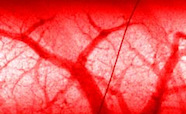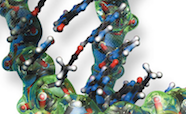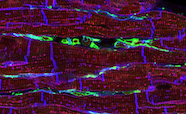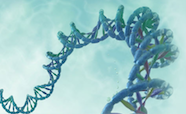Cardiology Research Unit
 The Cardiology Research Unit's research involves contributing to multi-centre trials, including trials of new devices for coronary angioplasty, and clinical trials of new drugs for management of heart attacks, cholesterol levels, and arrhythmia.
The Cardiology Research Unit's research involves contributing to multi-centre trials, including trials of new devices for coronary angioplasty, and clinical trials of new drugs for management of heart attacks, cholesterol levels, and arrhythmia.
Local research includes assessment of biomarkers as predictors of coronary stent re-stenosis after implantation.
The Research Unit is also performing a prospective study in patients with aortic valve disease evaluating what genes might be important in the development of narrowed heart valves in older persons.
Email medicine@otago.ac.nz
Web otago.ac.nz/dsm-medicine/research/otago046613.html
Cardiovascular and respiratory physiology
Within the Department of Physiology several laboratories conduct research concerned with the regulation of cardiovascular and respiratory function in both health and disease.
laboratories conduct research concerned with the regulation of cardiovascular and respiratory function in both health and disease.
Specific areas of interest include:
- How hormonal, neuronal and intrinsic processes control the heart
- Understanding the vasculature of the lungs
- Describing calcium regulation of heart rhythms
- Identifying pathogenic mechanisms operating in diseases such as obesity, diabetes, heart failure, hypertension and cardiac arrhythmia.
Email physiology@otago.ac.nz
Web otago.ac.nz/physiology/research
Centre for Translational Research
 The Centre for Translational Research (CTR) is a central research facility at the University of Otago, Wellington. It is designed to forge world-class research programmes that will accelerate the transfer of clinically-relevant scientific knowledge.
The Centre for Translational Research (CTR) is a central research facility at the University of Otago, Wellington. It is designed to forge world-class research programmes that will accelerate the transfer of clinically-relevant scientific knowledge.
Translation of non-clinical research that results in real world clinical applications is a major challenge for biomedical researchers. With increasing sub-specialisation in both medical and basic biomedical disciplines, such knowledge transfer can become fragmented unless concerted efforts are made to promote their integration. A hallmark of those involved in the CTR is a willingness to collaborate on projects which utilise both scientific and clinical expertise. This is in recognition of the importance we believe translational research provides in generating answers to clinical problems.
The following topics are of particular interest:
- Energy and metabolism
- Neurocritical care
- Cardiovascular genetics
- Exercise and environmental physiology
- Clinical physiology and biomedical engineering
- Paediatrics
- Acute and chronic airways disease
- Sleep medicine
Email ctr@otago.ac.nz
Web otago.ac.nz/uow-physiology
Christchurch Heart Institute
 Here at the Christchurch Heart Institute we help save thousands of lives through research into improved diagnosis, better prediction and advanced treatments for heart disease. Our team of internationally-renowned experts directly play a role in increasing the survival of New Zealanders with heart disease.
Here at the Christchurch Heart Institute we help save thousands of lives through research into improved diagnosis, better prediction and advanced treatments for heart disease. Our team of internationally-renowned experts directly play a role in increasing the survival of New Zealanders with heart disease.
Our research is focused on:
- New blood tests for heart attack diagnosis and prognosis
- Using new methods for treating heart failure and improving outcomes
- Understanding the genetics of heart disease; why heart disease runs in some families
Email chi@otago.ac.nz
Web otago.ac.nz/chch-heart-institute
Genetics Otago
 Genetics lies at the root of many human diseases. At Genetics Otago, we have a remarkable breadth of human genetics research studying both complex and single-gene diseases. As an example, researchers at the Cancer Genetics Laboratory are world-leaders in their field.
Genetics lies at the root of many human diseases. At Genetics Otago, we have a remarkable breadth of human genetics research studying both complex and single-gene diseases. As an example, researchers at the Cancer Genetics Laboratory are world-leaders in their field.
Our human developmental disease research provides an insight into how human embryos work, and how that is related to human health. We study both the genetics and epigenetics of human development and cell division.
Pharmocogenomics is another major area of research—this is a modern approach to understanding the side-effects of, and sensitivities to, drug treatments—by analysing the effect of a person's genes on their response to drugs.
Email go@otago.ac.nz
Web otago.ac.nz/genetics
Healthier Lives – He Oranga Hauora National Science Challenge 2015–2024
 The Healthier Lives – He Oranga Hauora National Science Challenge was a national research collaboration dedicated to achieving healthier lives for all New Zealanders.
The Healthier Lives – He Oranga Hauora National Science Challenge was a national research collaboration dedicated to achieving healthier lives for all New Zealanders.
It has contributed evidence, technology and tools that can help to achieve more equitable health outcomes in Aotearoa New Zealand.
The website remains available as a resource and for archived materials.
Heart Otago
 Heart Otago is comprised of cardiovascular researchers and clinicians located at the University of Otago and Dunedin Hospital. The goal of the group is to expand upon traditional cell and animal models to better understand the molecular nature of cardiac disease in patients with heart disease and to translate the laboratory-based cardiovascular research into the clinical setting.
Heart Otago is comprised of cardiovascular researchers and clinicians located at the University of Otago and Dunedin Hospital. The goal of the group is to expand upon traditional cell and animal models to better understand the molecular nature of cardiac disease in patients with heart disease and to translate the laboratory-based cardiovascular research into the clinical setting.
The strong link between fundamental researchers and clinicians allows the group to study cardiac disease from genetic mutations within a single protein, through tissue and animal models, to patients presenting with a range of cardiac anomalies.
Investigations involve a wide range of techniques including:
- Electrophysiology
- Cell imaging
- Genetic and biomarker screening
- Multicellular human tissue and whole animal heart function measurements
- Human and animal in vivo cardiac function via echocardiography
Email heart@otago.ac.nz
Web otago.ac.nz/heart-otago
Otago Genomics Facility
 We provide expertise and sequencing resources to New Zealand researchers and industry including:
We provide expertise and sequencing resources to New Zealand researchers and industry including:
- Project design and advice
- Illumina HiSeq sequencing
- Illumina MiSeq sequencing
- Nanostring nCounter Analysis System
The Otago Genomics Facility is an Illumina Propel-certified service provider for Illumina HiSeq 2500 and MiSeq sequencing platforms, and is also a Nanostring nCounter Analysis System core facility.
Email genomics@otago.ac.nz
Web otago.ac.nz/genomics
Pharmacology and Toxicology
 Research at the Department of Pharmacology and Toxicology uses state-of-the-art technologies, including the use of in-vivo disease models, to undertake integrative, cellular and molecular investigations aimed at understanding animal and human pathophysiology (and to delineate targets for novel drugs).
Research at the Department of Pharmacology and Toxicology uses state-of-the-art technologies, including the use of in-vivo disease models, to undertake integrative, cellular and molecular investigations aimed at understanding animal and human pathophysiology (and to delineate targets for novel drugs).
Academic and research-support staff of the Department are engaged in high quality, internationally-recognised research focused on the following themes:
- Cancer Research
- Cannabionids and Neuropathic Pain Research
- Cardiorenal and Diabetes Research
- Free Radical Research
- Neuroscience Research
- Neurotoxins / Seizures / Stroke Research
- Seizures / SUDEP / Stroke Research
- Stroke
- Vestibular and Auditory Research
Email pharmacology@otago.ac.nz
Web otago.ac.nz/phal/research/index.html
Research Infrastructure Centre
 Our Research Infrastructure Centre offers specialist expertise, technology and facilities in protein research, genomics, imaging, and biomedical research.
Our Research Infrastructure Centre offers specialist expertise, technology and facilities in protein research, genomics, imaging, and biomedical research.
We support optimum design and analysis of your research, and provide skill development opportunities.
Our academic leadership is of the highest calibre and we have extensively experienced and skilled staff.
Our services are available to researchers in institutions, industry, government and private companies.
Email ric.admin@otago.ac.nz
Web otago.ac.nz/healthsciences/research/ric
Search the Health Sciences Expertise Database
 The Division of Health Sciences benefits from its high calibre of staff and their wide range of skills and research expertise.
The Division of Health Sciences benefits from its high calibre of staff and their wide range of skills and research expertise.
Our Staff Expertise Database provides details on University of Otago, Health Sciences staff. Each staff profile provides information on qualifications, current academic position, contact details, and a summary of research and publications.
You can search our database by keyword (eg cardiovascular) or by name.
Health Sciences expertise database
Stroke neurology

Professor Anna Ranta's research focuses on stroke epidemiology and service delivery optimisation, service integration, health equity and knowledge translation. She is a Consultant Stroke Neurologist with Capital, Coast, and Hutt Valley District alongside her roles as Head of the Department of Medicine and Professor of Neurology at University of Otago Wellington. She is also the Clinical Co-Director for the National Hyper-Acute Stroke Service.
Current research projects include:
- Developing a national stroke data strategy with Te Whatu Ora
- Co-designing community stroke interventions for Māori living in rural areas
- Ongoing work on the REGIONS Care Study including linking data with the Integrated Data Infrastructure (IDI)
- Co-leading a Health Research Council programme grant sub-study on IDI data linkage to determine nationwide stroke epidemiology as part of the ARCOS V Study
- Evaluating Telestroke models of care in the pre-hospital and post-discharge settings
- Assessing the FeSS (“Fever, Sugar, Swallow”) tool within NZ Stroke Hospitals
- Testing feasibility of stroke service support in Pacific Islands
- Assessing an Atrial Fibrillation electronic decision support tool
Professor Ranta is accepting enquiries for PhD opportunities.
Email anna.ranta@otago.ac.nz
Web otago.ac.nz/healthsciences/expertise/profile/index.html?id=2356
Vascular Research Group
 The Vascular Research Group, in the Department of Surgical Sciences, Dunedin School of Medicine, is headed by Professor Andre van Rij and Professor Greg Jones, and conducts a wide range of research in the fields of vascular biology, genetics, and physiology.
The Vascular Research Group, in the Department of Surgical Sciences, Dunedin School of Medicine, is headed by Professor Andre van Rij and Professor Greg Jones, and conducts a wide range of research in the fields of vascular biology, genetics, and physiology.
This multidisciplinary group has a wide range of basic science and clinical skills, including molecular biology (genomics, transcriptomics, and proteomics), immunohistopathology, cell culture, and vascular physiology (ultrasonography).
The Vascular Research Group's primary research interests:
- The genetic basis of different forms of vascular disease including abdominal aortic aneurysm, coronary artery disease, lower limb arterial disease, stroke, and varicose veins
- Determining the early processes in the formation of atherosclerosis (arterial disease)
- The identification of circulating markers of vascular susceptibility and/or post-interventional outcome
- Determining the pathophysiology of venous disease
The Vascular Research Group is currently funded by the Health Research Council of New Zealand.
Our research group is a leading member of the Vascular Research Consortium of New Zealand, which aims to support collaborative vascular networks nationally.
Email andre.vanrij@otago.ac.nz
Web otago.ac.nz/dsm-surgery/research/vascular
Wellington Cardiovascular Research Group
 Cardiovascular disease remains the leading cause of death, and a significant cause or morbidity in the western world. The Wellington Cardiovascular Research Group undertakes basic science projects, translational research and clinical research into ischaemic heart disease, heart failure and cardiac arrhythmia.
Cardiovascular disease remains the leading cause of death, and a significant cause or morbidity in the western world. The Wellington Cardiovascular Research Group undertakes basic science projects, translational research and clinical research into ischaemic heart disease, heart failure and cardiac arrhythmia.
Our current areas of research interest include:
- Platelet reactivity and inflammation in ischaemic heart disease
- Technical aspects of interventional cardiology
- Mechanisms of ventricular arrhythmia
- Provision of implantable cardioverter defibrillator therapy
- Applications of novel imaging techniques to aid in diagnostic processes
- Scoring tools for risk stratification in cardiac disease
Email peter.larsen@otago.ac.nz
Web otago.ac.nz/wellington/research/wcrg